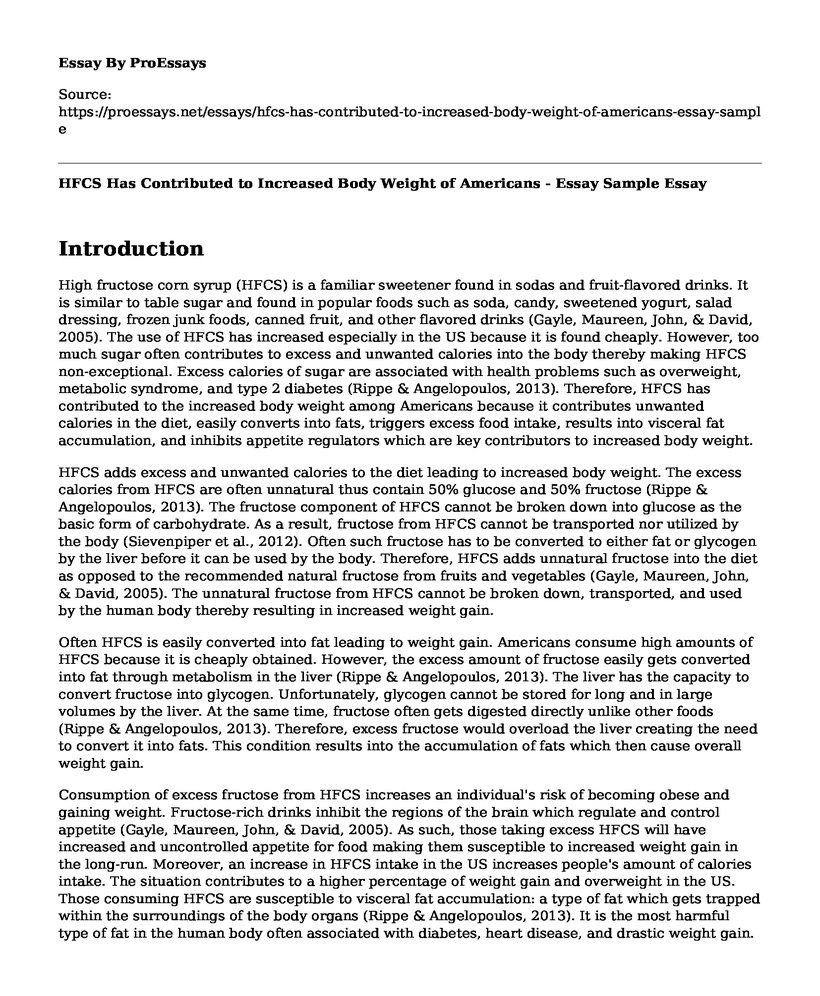Introduction
High fructose corn syrup (HFCS) is a familiar sweetener found in sodas and fruit-flavored drinks. It is similar to table sugar and found in popular foods such as soda, candy, sweetened yogurt, salad dressing, frozen junk foods, canned fruit, and other flavored drinks (Gayle, Maureen, John, & David, 2005). The use of HFCS has increased especially in the US because it is found cheaply. However, too much sugar often contributes to excess and unwanted calories into the body thereby making HFCS non-exceptional. Excess calories of sugar are associated with health problems such as overweight, metabolic syndrome, and type 2 diabetes (Rippe & Angelopoulos, 2013). Therefore, HFCS has contributed to the increased body weight among Americans because it contributes unwanted calories in the diet, easily converts into fats, triggers excess food intake, results into visceral fat accumulation, and inhibits appetite regulators which are key contributors to increased body weight.
HFCS adds excess and unwanted calories to the diet leading to increased body weight. The excess calories from HFCS are often unnatural thus contain 50% glucose and 50% fructose (Rippe & Angelopoulos, 2013). The fructose component of HFCS cannot be broken down into glucose as the basic form of carbohydrate. As a result, fructose from HFCS cannot be transported nor utilized by the body (Sievenpiper et al., 2012). Often such fructose has to be converted to either fat or glycogen by the liver before it can be used by the body. Therefore, HFCS adds unnatural fructose into the diet as opposed to the recommended natural fructose from fruits and vegetables (Gayle, Maureen, John, & David, 2005). The unnatural fructose from HFCS cannot be broken down, transported, and used by the human body thereby resulting in increased weight gain.
Often HFCS is easily converted into fat leading to weight gain. Americans consume high amounts of HFCS because it is cheaply obtained. However, the excess amount of fructose easily gets converted into fat through metabolism in the liver (Rippe & Angelopoulos, 2013). The liver has the capacity to convert fructose into glycogen. Unfortunately, glycogen cannot be stored for long and in large volumes by the liver. At the same time, fructose often gets digested directly unlike other foods (Rippe & Angelopoulos, 2013). Therefore, excess fructose would overload the liver creating the need to convert it into fats. This condition results into the accumulation of fats which then cause overall weight gain.
Consumption of excess fructose from HFCS increases an individual's risk of becoming obese and gaining weight. Fructose-rich drinks inhibit the regions of the brain which regulate and control appetite (Gayle, Maureen, John, & David, 2005). As such, those taking excess HFCS will have increased and uncontrolled appetite for food making them susceptible to increased weight gain in the long-run. Moreover, an increase in HFCS intake in the US increases people's amount of calories intake. The situation contributes to a higher percentage of weight gain and overweight in the US. Those consuming HFCS are susceptible to visceral fat accumulation: a type of fat which gets trapped within the surroundings of the body organs (Rippe & Angelopoulos, 2013). It is the most harmful type of fat in the human body often associated with diabetes, heart disease, and drastic weight gain.
Conclusion
In summary, HFCS has contributed to increased body weight among Americans. HFCS intake in the US has increased because it is cheap to acquire. However, it adds excess and unwanted calories in the diet, easily converts in fats, triggers excess food intake, results into visceral fat accumulation, and inhibits appetite regulators. These situations are key contributors to sudden weight gain, obesity, and other health complications.
References
Gayle, L. H., Maureen, S. L. John, W. S. & David, R. L. (2005). Highs and lows of high fructose corn syrup: A report from the center for food and nutrition policy and its cares workshop. Nutrition Today, 40(6), 253-256.
Rippe, M. J., & Angelopoulos, J. T. (2013). Sucrose, high-fructose corn syrup, and fructose, their metabolism and potential health effects: What do we really know? Advances in Nutrition: An International Review Journal, 4(2), 236-245.
Sievenpiper, J. L., de Souza, R. J., Mirrahimi, A., Yu ME, Carleton, A. J., Beyene, J., et al. (2012). Effect of fructose on body weight in controlled feeding trials: A Systematic review and meta-analysis. Ann Intern Medicine 156(4), 291-304.
Cite this page
HFCS Has Contributed to Increased Body Weight of Americans - Essay Sample. (2022, Nov 21). Retrieved from https://proessays.net/essays/hfcs-has-contributed-to-increased-body-weight-of-americans-essay-sample
If you are the original author of this essay and no longer wish to have it published on the ProEssays website, please click below to request its removal:
- Zero Waste Consumption. Ecology Essay Example
- A Policy for the Americans With Disabilities Act (ADA) Essay
- Healthcare Access Essay Example
- Essay Sample on Tech Advances in Healthcare: Improving Lives & Increasing Quality
- Paper Example on Dust Storms: A Risk to Our Lungs' Health
- Midlife Physical Decline: Strategies to Reduce Negative Effects - Essay Sample
- Essay Example on Health Care Safety: Essential For Quality Service Delivery & Profitability







